
Enterprise Software Market
Introduction
The enteprise softwarer market is a cornerstone of modern business operations. It encompasses applications designed to help organizations manage and automate core functions such as accounting, human resources, customer relationships, and supply chains. From small startups to multinational corporations, businesses across industries rely on enterprise software to drive efficiency, streamline processes, and improve decision-making.
As companies undergo digital transformation, the demand for advanced enterprise software continues to surge. Emerging technologies like artificial intelligence (AI), cloud computing, and blockchain are reshaping how businesses interact with and deploy software solutions. In this comprehensive exploration of the enterprise software market, we'll dive into its size, growth factors, competitive landscape, and future opportunities.
Market Size and Growth Potential
The global enterprise software market is experiencing significant growth, fueled by digitalization and technological advancements. According to recent reports, the market was valued at approximately USD 500 billion in 2023 and is projected to reach USD 850 billion by 2030, growing at a CAGR of 7.8%.
Key factors driving market growth include:
- Digital Transformation Initiatives: Organizations are adopting software solutions to modernize operations and remain competitive.
- Cloud Adoption: Cloud-based enterprise software offers scalability, cost-efficiency, and remote accessibility.
- Automation Needs: Increasing demand for automation in data processing and operational workflows is accelerating software deployment.
Regional Market Insights:
- North America: Holds the largest market share due to advanced technological infrastructure and high investment in enterprise systems.
- Europe: Strong focus on compliance and data protection is driving the adoption of secure, regulatory-compliant software.
- Asia-Pacific: Fastest-growing region due to rapid industrialization and increasing adoption of cloud services in countries like China and India.
Types of Enterprise Software
Enterprise software spans a variety of applications tailored to support diverse business functions. Let’s break down the core categories:
Enterprise Resource Planning (ERP) Software
- Integrates business processes such as finance, supply chain, and HR.
- Leading ERP providers: SAP, Oracle, Microsoft Dynamics.
Customer Relationship Management (CRM) Software
- Manages customer data, tracks interactions, and improves sales processes.
- Key players: Salesforce, HubSpot, Zoho.
Supply Chain Management (SCM) Software
- Optimizes supply chain processes, including inventory management and logistics.
- Notable providers: SAP, Oracle, Blue Yonder.
Business Intelligence (BI) and Analytics Tools
- Enables data-driven decision-making through advanced analytics and visualization.
- Leaders: Tableau (Salesforce), Microsoft Power BI, Qlik.
Human Resource Management (HRM) Software
- Streamlines employee management, payroll, and talent acquisition.
- Market leaders: Workday, ADP, BambooHR.
Key Market Segments
The enterprise software market is segmented by deployment model, industry vertical, and organization size:
By Deployment Model
- On-Premise Software: Installed on local servers, offering full control but higher costs.
- Cloud-Based (SaaS): Flexible, cost-efficient, and ideal for remote collaboration.
By Industry Vertical
- Manufacturing: ERP for production tracking.
- Healthcare: Compliance-focused solutions (e.g., HIPAA-compliant software).
- BFSI (Banking, Financial Services, and Insurance): Robust systems for regulatory compliance and risk management.
By Organization Size
- Small and Medium Enterprises (SMEs): Favor cloud-based solutions due to affordability.
- Large Enterprises: Often require customizable, integrated systems for global operations.
Regional Insights
Understanding regional variations in the enterprise software market provides insight into market dominance, emerging opportunities, and growth potential worldwide.
1. North America
North America, particularly the United States, is the largest market for enterprise software. This dominance stems from early adoption of advanced technologies and continuous innovation.
Market Characteristics:
- High demand for cloud-based and SaaS (Software-as-a-Service) solutions.
- Emphasis on cybersecurity and compliance due to stringent regulations (e.g., HIPAA, SOX).
- Leading hub for major enterprise software providers, including Microsoft, Oracle, and Salesforce.
Trends Driving Growth:
- Adoption of AI-powered analytics for decision-making.
- Growing investments in remote collaboration and hybrid work tools.
- Mergers and acquisitions fostering rapid expansion.
2. Europe
The European enterprise software market is driven by regulatory compliance and a focus on data privacy. Countries like Germany, France, and the UK lead the region’s adoption.
Market Characteristics:
- Strict adherence to GDPR (General Data Protection Regulation).
- Preference for open-source and localized software solutions.
- Increasing investments in Industry 4.0 technologies.
Trends Driving Growth:
- Expansion of cloud migration across large enterprises.
- Increased use of business intelligence for financial analysis.
- Demand for sustainable software and energy-efficient data centers.
3. Asia-Pacific
The Asia-Pacific region is the fastest-growing segment, driven by rapid digitalization and an expanding small- to medium-sized business (SMB) sector.
Market Characteristics:
- China and India are the primary growth drivers.
- Government-led digital initiatives support market expansion.
- High demand for cost-effective cloud-based solutions.
Trends Driving Growth:
- Adoption of AI and machine learning for automation.
- Increasing investments in e-commerce and FinTech sectors.
- 5G technology enabling real-time data and analytics.
4. Latin America and the Middle East & Africa (MEA)
While these regions represent smaller shares of the global market, they present significant growth opportunities due to increasing internet penetration and digital transformation.
Market Characteristics:
- Growing demand for affordable, scalable enterprise solutions.
- Government incentives supporting digital transformation in public sectors.
Trends Driving Growth:
- Rise in cloud adoption for SMEs.
- Investments in smart city projects and digital governance.
- Increasing focus on cybersecurity solutions.
Market Drivers and Restraints
Key Market Drivers
Digital Transformation Initiatives
Businesses across industries are adopting enterprise software to improve productivity, optimize processes, and enhance customer experience.
Increased Demand for Cloud Solutions
Cloud-based software offers flexibility, remote access, and cost savings, making it the preferred choice for modern enterprises.
AI and Machine Learning Integration
AI-driven enterprise software enhances automation, predictive analytics, and decision-making capabilities.
Remote Work and Hybrid Models
The rise of hybrid work requires advanced collaboration and project management tools, fueling demand for enterprise software.
Market Restraints
High Implementation Costs
Implementing and maintaining enterprise software requires substantial financial investment and skilled personnel.
Data Security and Privacy Concerns
With increasing cyber threats, companies face challenges ensuring data protection and meeting regulatory compliance.
Integration Complexities
Integrating new enterprise software with legacy systems is a significant challenge, especially for large organizations.
Competitive Landscape
The enterprise software market is characterized by fierce competition among tech giants, emerging startups, and regional players.
Major Players in the Enterprise Software Market
| Company | Core Solutions | Market Position |
|---|---|---|
| Microsoft | ERP (Dynamics), Collaboration (Office 365) | Market leader in enterprise SaaS. |
| Oracle | ERP, Database Management | Strong presence in cloud ERP. |
| SAP | ERP, Supply Chain, HRM | Global leader in ERP solutions. |
| Salesforce | CRM, Marketing Automation | Dominant in cloud-based CRM. |
| IBM | AI, Analytics, Cybersecurity | Leader in AI-powered solutions. |
Key Strategies for Market Dominance
- Innovation & R&D: Continuous investment in cutting-edge technologies (e.g., AI, blockchain).
- Mergers & Acquisitions: Consolidation to expand product offerings and enter new markets.
- Customer-Centric Approaches: Personalized software solutions tailored to specific industries.
Consumer Behavior and Buying Trends
Shift Toward Subscription-Based Models
The Software-as-a-Service (SaaS) model is popular due to its flexibility and lower upfront costs.
Demand for Scalability and Customization
Enterprises seek solutions that grow with their business and provide industry-specific customization.
Emphasis on User Experience (UX)
User-friendly interfaces and seamless integration drive software adoption.
Technological Innovations in Enterprise Software
Artificial Intelligence (AI) and Machine Learning (ML)
AI enhances software capabilities like automation, predictive analytics, and chatbots.
Blockchain Technology
Ensures data security, traceability, and transparent business operations.
Low-Code and No-Code Platforms
Simplify software development, allowing non-technical users to create custom applications.
Regulatory Framework and Compliance
- GDPR (General Data Protection Regulation): EU regulation for data protection and privacy.
- CCPA (California Consumer Privacy Act): U.S. law ensuring consumer data rights.
- Industry-Specific Compliance: Regulations such as HIPAA (healthcare) and SOX (finance).
Impact of COVID-19 on the Enterprise Software Market
- Acceleration of Cloud Adoption: Increased demand for cloud and remote collaboration tools.
- Cybersecurity Focus: Growth in data protection and access control solutions.
- Operational Resilience: Investment in software ensuring business continuity.
Future Trends and Market Opportunities
- Industry-Specific Software Solutions: Tailored applications for healthcare, retail, and finance.
- Hybrid Cloud and Edge Computing: Blending on-premise and cloud solutions for agility.
- Sustainable Software Development: Eco-friendly software with reduced energy consumption.
Investment Opportunities in the Enterprise Software Market
- AI-Driven Platforms: Investing in intelligent automation and predictive analytics.
- Cloud Migration Solutions: Companies facilitating the shift to the cloud.
- SME-Focused Solutions: Affordable, scalable software for small businesses.
Case Studies of Leading Enterprise Software Implementations
- Walmart’s ERP Transformation: Implemented SAP for improved supply chain efficiency.
- Salesforce Adoption at Coca-Cola: Enhanced customer engagement through CRM.
Conclusion
The enterprise software market is on a robust growth trajectory, fueled by digital transformation and emerging technologies. Businesses investing in scalable, innovative solutions will thrive in a competitive environment.
For more details: https://www.databridgemarketresearch.com/reports/global-enterprise-software-market
You Might Like Also

Enhancing Residential Areas: Sustainability, Safety, and Smart Design

Keeping Your Facility Running: Common Industrial Plumbing Repairs

Practical Steps to Secure Your Family’s Financial Future

Best Industries for Investments in Today’s Market

Essential Insights into Today’s Tactical Equipment Market

What’s Next for Electricians? Career Insights for the Future














